The following backdrop and questions apply to this part of the series of musings and open discussion on entrepreneurs and decision-making (See Part 1, Part 2, Part 3, Part 4, Part 5):
Are entrepreneurs more willing to fail than other people? Does this relate to the exploration versus exploitation differences in the sense that entrepreneurs may simply continue exploring new opportunities until they find one that works? How should they trade off a willingness to walk away from a faltering opportunity against the need for persistence, on the chance that the opportunity can still be saved? Do you think this behavior explains serial entrepreneurs?
Here are my off-the-cuff thoughts on these exploratory research questions. Subconsciously and by choice of profession, entrepreneurs are generally more willing to fail than others, particularly when their entire livlihood and financial security are not at stake. This has been one of the most common perspectives that I had been ingrained with, particularly as it relates to debates on founder liquidity (and restricting it). That said, entrepreneurs (and particularly serial entrepreneurs) do not consciously believe that they will fail. They seem to generally have an attitude of "I will win".
To the decision-making question of "walking away" versus "persistence" for a faltering opportunity, I believe that entrepreneurs should consider leveraging mechanisms, such as:
- having a good principal/partner as a founder that can complement the skillset of the CEO
- seeking Board of Directors input
- having an informal "godfather" (established in advance) that the principals or the CEO can turn to for important decision points and/or when disagreements arise in the management ranks.
As to what drives serial entrepreneurs, my thinking is that appetite for creation, personality type, need for independence, promise of financial gain, and ego tend to drive the serial-types more than decision-making tendencies of "walk away" versus "persistence". That said, often serial entrepreneurs have a personal investment philosophy that in the long-run, by starting and running ventures, eventually one of them will pan out very nicely, and they will have learned from their failures and flops. Failing is an important part of the process, and I even remember an executive recruiter for Sequoia Capital commenting to me during an interview for a position in the late 90s that the major downside to my resume at the time for being venture capital associate was that I had not "founded and flopped" a business.
What are your thoughts and experiences?
*********************************************************************************************************************
Please enter your email address to subscribe to updates on Steve Shu's blog.
Powered by FeedBlitz
